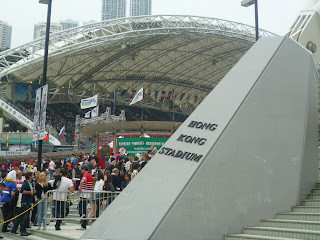Teaching in the Jockey Club Primary School commenced this week and it has certainly been a week of new experiences for me! I have always found teaching practice back home a demanding and tiring few weeks but inevitably it has always shown me that I love to teach and the hard work is well worth it in the end. I have found school life in Hong Kong to be slightly more relaxed as I am only teaching English as a second language to children in year 2 and year 6 (our p3 and p7). However the most challenging part has been trying to adapt to a new way of teaching, constantly having to remind myself that this is a foreign language for these children and I have to cover all parts of the English language, regardless of how small and insignificant they may seem to me! Teaching the children has also made me more aware of the need to be a good communicator, presenting new words accurately and discussing things clearing with the children. My first lesson was on the topic of cows and why they have four stomachs, so as you could probably guess, Ballymena people tend to say the word ‘cow’ a lot differently from others in the world! (I quickly realised my mistake though and everything became a little clearer for the children!!) One of the most challenging aspects of teaching here has been trying to help those children who are from Mainland China. There is a very distinct lack of motivation from most of these children to develop their English language skills and it is very obvious that they have few opportunities to practice and refine their skills at home. It is difficult for me to offer them words of encouragement as they carry out their tasks, as they just do not understand what I am saying. I have tried to communicate with them through the class teacher but I feel that for these children to progress in their English, the work in the classroom needs to be adapted in a certain way to suit their needs. I have tried to include visual prompts as I teach and from time to time I have other children in the class translate so that they can understand exactly what is going on. I realise that these methods are very basic, however it is important for these children to practice these skills at school as this is very often the only place they can learn the English language.
 |
| The 7 storey Jockey Club Primary School |
The teachers in the school have been extremely friendly and helpful, and we have had a meeting with the head of the parent-teacher association who would like us to carry out home visits to see some of the children in their home setting. This will be an excellent experience not only for the children as it will give them the opportunity to practice and become more confident in speaking English, but also for me as I visit the parents and interact with them.
As the numbers of children who enter our primary schools in Northern Ireland with English as a second language increases, I feel that this experience of teaching English in Hong Kong will help me to develop teaching strategies and a better understanding of how best to teach ESL children. (I will hopefully have more pictures of the school and of me teaching after Easter)

















